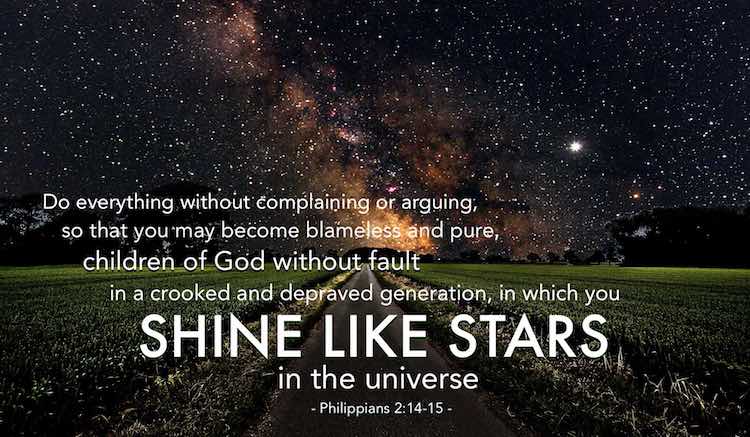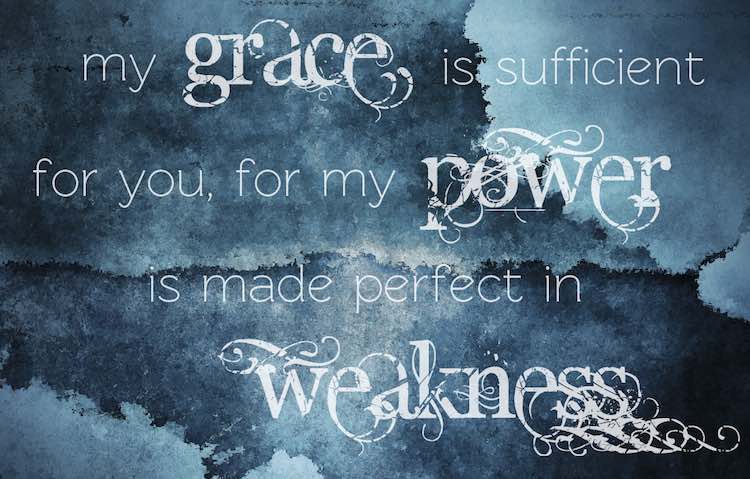To complain or not to complain, this is a choice that each of us makes everyday as we face various challenges in life. When we don’t have the things that we want or need in life, we must choose how we will react and respond.
Children generally whine, scream, and throw temper tantrums in order to get what they want. As adults, we learn how to be more dignified in our responses. We learn how to get what we want through complaining, demanding, or manipulation. We also learn how to use a situation and alter the facts to make sure that the other party is to blame so that they feel guilty and agree to meet our demands. This is the natural, worldly method of achieving goals.
The Higher Calling
The Bible calls us to walk a different path. We are called to live above the worldly standards and learn to do things God’s way:
Do all things without grumbling or disputing; so that you will prove yourselves to be blameless and innocent, children of God above reproach in the midst of a crooked and perverse generation, among whom you appear as lights in the world, … – Philippians 2:14-15
This is a strong exhortation that calls us to turn 180 degrees from the worldly response of grumbling and disputing. As all of us know, this is easier said than done.
The verses above in Philippians chapter two are a simple exhortation that some of us need to be reminded of everyday, myself included. We are called to be lights that shine forth the glory of God in this world. One way to be light in this world is to discipline ourselves not to grumble, complain, or argue about anything.
When God brought the children of Israel out of Egypt, He called them to be a nation that would be a light to the world, however whenever they faced challenges, they often grumbled and complained against Moses and God. This is clearly seen in this week’s Torah Portion.

Be’Shalach – בשלח
The name of this week’s Torah Portion is “בשלח” – “be’shalach” and simply means “when he sent out” or “when he let them go.” This phrase is referring to Pharaoh’s action of finally setting the Israelites free from Egypt and is found in the first verse of this week’s study:
Now when Pharaoh had let the people go, God did not lead them by the way of the land of the Philistines, even though it was near; for God said, “The people might change their minds when they see war, and return to Egypt.” – Exodus 13:17
After Pharaoh lost his firstborn son in the tenth and final plague, Pharaoh had had enough and he released the Israelites. The Israelites set out from Egypt and God led them through the desert instead of leading them by the sea to prevent them from being confronted by the Philistines, as noted in the above verse.
Life in the Desert
It didn’t take long after leaving Egypt for the Israelites to face the first of many challenges that they would meet in their desert journeys. The very first challenge that confronted them was orchestrated by God Himself:
Now the LORD spoke to Moses, saying, “Tell the sons of Israel to turn back and camp before Pi-hahiroth, between Migdol and the sea; you shall camp in front of Baal-zephon, opposite it, by the sea. For Pharaoh will say of the sons of Israel, ‘They are wandering aimlessly in the land; the wilderness has shut them in.’ Thus I will harden Pharaoh’s heart, and he will chase after them; and I will be honored through Pharaoh and all his army, and the Egyptians will know that I am the LORD.” And they did so. – Ex. 14:1-4
The LORD had Moses direct the children of Israel to a location where they would box themselves into a corner without a natural way of escape. God had a plan and according to this plan He needed His people to obey His voice and trust Him.
Moses led the people to the place that God had specified and Pharaoh and his army were quick to take the opportunity to chase after the Israelites, just as the LORD had said they would (Ex. 14:5-9). When the Israelites saw Pharaoh and his army approaching, they immediately began to fear and grumble:
As Pharaoh drew near, the sons of Israel looked, and behold, the Egyptians were marching after them, and they became very frightened; so the sons of Israel cried out to the LORD. Then they said to Moses, “Is it because there were no graves in Egypt that you have taken us away to die in the wilderness? Why have you dealt with us in this way, bringing us out of Egypt? Is this not the word that we spoke to you in Egypt, saying, ‘Leave us alone that we may serve the Egyptians’? For it would have been better for us to serve the Egyptians than to die in the wilderness.” – Exodus 14:10-12
The Israelites felt trapped and they immediately responded in fear as they cried out to God and blamed Moses for their situation.
Fear, Blame, and Complaining
The Israelites began by crying out to the LORD, however, it seems like it was a one way conversation. Rather than crying out to God and waiting for His response they immediately blamed Moses for bringing them out of Egypt. The Israelites remembered their previous situation as slaves in Egypt and longed to return to slavery rather than face death in the desert. It is natural to look back to our last situation and want to return to a place of relative comfort when we are faced with unexpected challenges in life.
The Israelites acted in the flesh and responded in the typical worldly manner like many of us do when we find ourselves in similar circumstances. When we are faced with a situation where we feel trapped and are unable to do anything, fear rises up and we must decide how to handle that fear. We can either give into fear, blame whoever is responsible, and complain or we can seek God and understand the situation from His perspective. We can always choose our response, no matter what the situation.
It is often difficult to think spiritually and to have a clear mind when we are in the midst of earthly chaos. None of us like to appear weak or to admit that we are unable to handle the challenges that we are facing in life. We want to appear strong and to show the world that we can do anything, however, this is not the people that God calls us to be. The LORD calls us to seek Him, to wait on Him, and to trust in Him at all times. We need to be responsible with our time and resources, however at the same time, we must learn to trust God with everything in life, especially with the unknown and impossible situations.
Waiting on God
The Israelites were learning an important lesson as they stood trapped between the sea and the Egyptian army. They originally reacted in fear, however, Moses immediately intervened in order to calm their fears:
But Moses said to the people, “Do not fear! Stand by and see the salvation of the LORD which He will accomplish for you today; for the Egyptians whom you have seen today, you will never see them again forever. The LORD will fight for you while you keep silent.” – Ex. 14:13-14
Moses told the Israelites that God had a plan to save them and he instructed them to not be afraid, to be silent, and to see the salvation of the LORD.
There was nothing that the Israelites could do in their own strength and ability as they stood on the shores of the Sea of Reeds. The only thing that God wanted from the Israelites was to stand there and see His salvation. God then instructed Moses to raise his staff over the sea. The sea was divided and God caused a strong wind to blow all night in order to dry the land. The LORD then had the Israelites escape through the sea on dry ground but He killed Pharaoh and the Egyptians when they tried to chase after the Israelites through the same divided sea (Ex. 14:15-29).

Salvation through Silence
The LORD did not give His people weapons of war or call them into battle at that time. The LORD called His people to remain silent and to appear weak before the mighty army of Pharaoh in order to show His power:
Thus the LORD saved Israel that day from the hand of the Egyptians, and Israel saw the Egyptians dead on the seashore. When Israel saw the great power which the LORD had used against the Egyptians, the people feared the LORD, and they believed in the LORD and in His servant Moses. – Ex. 14:30-31
The mighty power of the LORD was displayed before the Israelites in such a way that they believed in the LORD and in Moses, however, their faith was short lived.
The Israelites faced four more challenges that are recorded in this week’s study alone (Ex. 13 – Ex. 17) and with every challenge except the final one (Ex. 17:8-13), the people grumbled and complained against Moses and Aaron (Ex. 14:10-12. 15:24. 16:2. 17:2). In one of the later challenges, we learn that the grumbling and complaining of the people was not just against Moses and Aaron:
Therefore the people quarreled with Moses and said, “Give us water that we may drink.” And Moses said to them, “Why do you quarrel with me? Why do you test the LORD?” – Ex. 17:2
The people did not have any water and they were angry with Moses. The people quarreled with Moses but Moses stated that by doing this they were really testing the LORD.
Testing the LORD
Moses was a prophet of God and he represented God on earth. God used Moses to lead the people and when the people argued and complained against Moses it became a personal affront to God Himself. We see this more specifically written out at the conclusion of this particular situation:
He named the place Massah and Meribah because of the quarrel of the sons of Israel, and because they tested the LORD, saying, “Is the LORD among us, or not?” – Ex. 17:7
The arguing and complaining of the people was ultimately interpreted as testing the LORD Himself and questioning His presence in their midst.
The way that we respond to the challenges that we face in life reveal who we are: we either give God an opportunity to show His power in and through us or we stifle His power through our lives as we question whether God is really here or not. Walking in faith with Almighty God demands that we put aside all arguing and complaining in order to trust Him for the unknown circumstances that we will face.
Power in Weakness
God is not looking for strong and perfect people to follow after Him, but rather He is seeking for those who are weak in themselves and willing to trust Him with the unknown and unexplainable circumstances. We read of an example of this in the Apostle Paul’s life when He continually sought the Lord to free him from a certain physical infirmity. The Lord responded to Paul with these words:
And He has said to me, “My grace is sufficient for you, for power is perfected in weakness.” Most gladly, therefore, I will rather boast about my weaknesses, so that the power of Messiah may dwell in me. – 2 Corinthians 12:9
Paul found peace in his affliction as he understood that God would use him all the more and that He would display His power through his weaknesses.
Paul spoke about boasting in his weaknesses so that the power of the Messiah would dwell in him. This is a perfect example of trusting in God instead of arguing and complaining. Paul suffered physically and sought the Lord to set Him free but God said no. Paul accepted the Lord’s response and found a way to walk forward in joy and contentment.
Choosing God’s way instead of arguing and complaining is a choice we must all make. We may appear weak and feeble to the world around us, however, God promises to use our weaknesses as a channel for His power. I was reminded of this afresh during my recent journey to Australia.

Walking in Weakness
As I was traveling to Australia, I had a connecting flight in Istanbul which would bring me to Doha, Qatar and then to Perth, Australia. While I was waiting in Istanbul for my flight, it was snowing outside and the flight to Doha was delayed for two hours. As a result of the delay, I missed my next connecting flight from Doha to Australia. The airline put me up in a hotel in Doha until there was a flight the following day. The airline also issued me a new ticket and I went to the hotel for a rest.
The next day, before I returned to the airport, I looked at my newly issued ticket online and noticed that they had given me a middle seat instead of my former window seat on the original flight. It was a long twelve-hour flight from Doha to Australia and I couldn’t imagine being stuck in a middle seat for all that time. When I arrived at the Doha airport I immediately went to the checkin counter to explain my situation and asked for either a window or an isle seat. The woman at the checkin desk was very kind but told me that there were no other isle or window seats available and that I was situated in the closet middle seat for this flight.
As I have been living in the Middle East for a few years now I know that nothing is attained easily and that one needs to fight and demand for what one wants in order to obtain it, so I decided to be more aggressive with my request. I told the woman at the counter that I had a window seat on my original flight and that I was planning to arrive a day earlier. I then told her that it is now a day later and I’m stuck in a middle seat for twelve hours and when I arrive in Australia I will have to go immediately from the airport to attend a scheduled dinner and if I’m stuck in a middle seat for twelve hours I won’t be able to properly rest on the plane. I then concluded by saying that because there are no more regular seats available I would like to sit in first class. The woman listened to my story and understood my plight. She then said that she would have to ask her supervisor to get permission. She asked her supervisor and the supervisor said YES!
I was excited as the circumstances were finally looking up and it seemed like I was going to be promoted from economy to first class as a result of this missed connection. The airline employee started processing my first class ticket but then something happened in the process that prevented her from issuing the ticket. After 15-20 minutes of phone calls, she told me that she was unable to issue me a first class ticket and that I had to go to the customer service area on the second floor. My flight was leaving in about one hour and I needed to act fast.
I went up to the second floor and spoke with the supervisor there about my situation but she told me that they were not able to issue me a first class ticket. I then requested to talk with her manager but she refused to let me speak with him. I demanded that I talk with the manager and she finally gave in. When I talked with her manager he gave me the same answer, NO! I finally accepted that it wasn’t going to happen. It was getting late and I only had about 45 minutes until the flight. I was dreading my middle seat status for the next twelve hours but there was nothing else that I could do. I walked to my gate and boarded the plane.
Stuck in the Middle
Why would God allow me to be caught in a circumstance like this where I had absolutely no control over my situation? I felt completely trapped and had achieved absolutely nothing with all of my complaining and arguing. I was dreading my flight but I had to make the most of it.
I was the first one to arrive in our row of three seats and took my seat in the middle. Shortly after I got settled in, my two neighbors joined me, one on my right and the other on my left. They were both younger women who seemed friendly enough. The young lady to my right sat down, went to sleep, and never said a word for the twelve-hour flight. The young woman on my left, however, was quite friendly and we started talking even before the plane took off.
The woman on my left was a 17 year-old young lady from Poland who calls herself an atheist. Although she calls herself an atheist she was very open to talking about God. In fact, she asked me questions about faith and belief in God and Yeshua for the first 2-3 hours of our flight as I was stuck in the middle seat.

Perfected in Weakness
After the hour and a half of complaining and arguing about my plight of being stuck in a middle seat for twelve hours to the airline staff, I finally realized why God didn’t allow my seat to be changed. God is more concerned in using us for His glory than in our temporary comfort. God’s power is perfected in our weakness!
Shabbat Shalom
If you enjoyed reading this article, share it today with friends! We also invite you to sign up for our weekly Torah Portion commentary on the sidebar to the right.
Help keep our weekly commentaries free and available to all. Click here to donate today:
Torah Portion: Ex. 13:17 – Ex. 17:16
Haftara: Judges 4:4 – Judges 5:31
Return to Torah Portion Homepage
Copyright Jewels of Judaism. All rights reserved 2017



Excellent commentary! Thank you.
Thank you, Daniel. How wonderful that God gave you such a good living example of His plan for you! It is true that His plan always have redemptive and eternal significance. I’m glad you had a good trip.
Amen! Thanks Rosa.
The Lord often leads us to be silent, to obey by faith and to hope in Him.
To believe and then to see how He works in our “wilderness”!. I’m convinced that´s the safe way!
Blessings!
That was a good summary Yazmin!